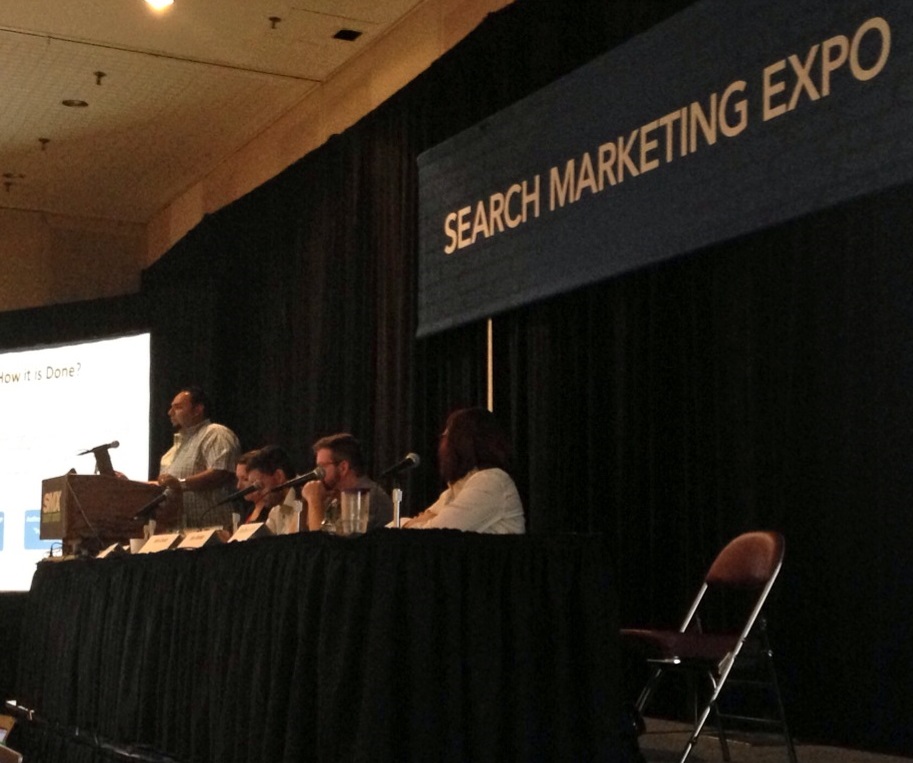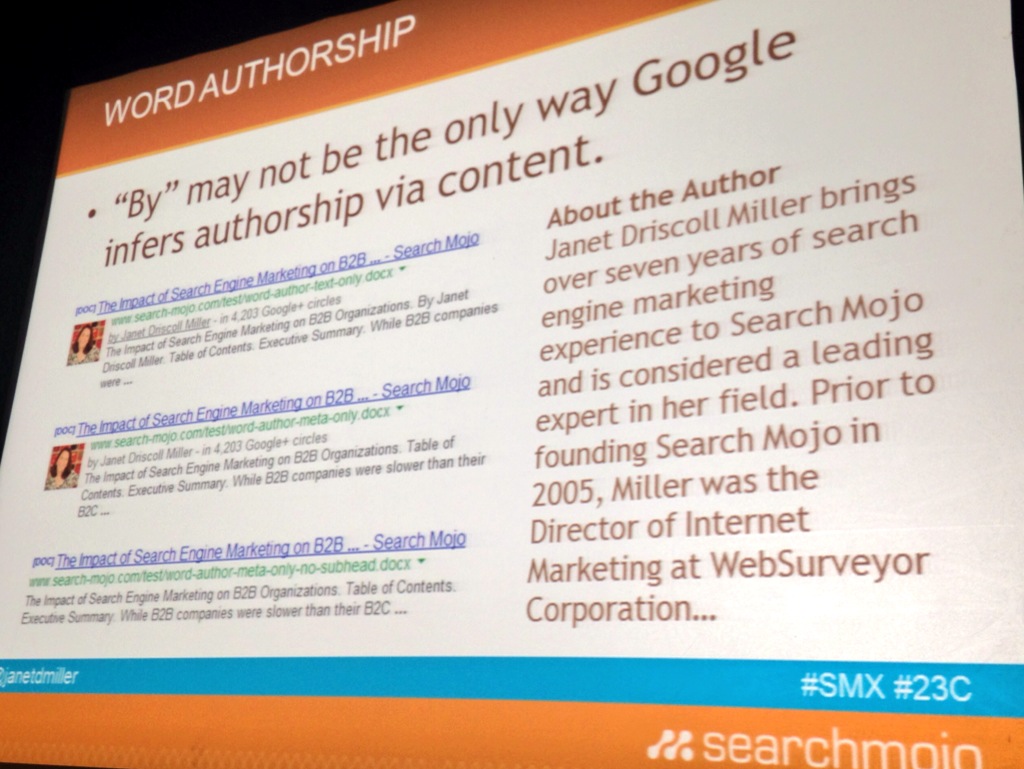Last week, Brafton was at SMX East and we covered the great Authorship debate – ranking benefits or no ranking benefits? Google did not confirm that Authorship can help rankings, in fact Webmaster Trends Analyst Pierre Far denied it. But there was still a compelling case for its SEO impact, and author badges are an undeniable credibility factor for users . The experts in attendance also shared tips to ensure marketers know the best steps for setup.
Panelists offered insights on common technical problems and best use cases for Authorship. (You can also read more in Brafton’s free guide on Authorship implementation.)
How a Googler says to set up Authorship
Far started off by giving some quick and dirty tips on the Google-approved method(s) for Authorship setup.
Use the implementation easiest for you. – Google’s Webmaster Trends Analyst Pierre Far
1. Use the implementation easiest for you. Google gets the most questions about “rel=author and rel=me” setup. To overcome issues with this implementation strategy, Far said simply use the “Google+ contributor to” method or domain email verification. Simple and correct is best.
2. Mark up all authors who wrote an article. Even though search UI only supports the first listed author, it’s still advisable to create the markup for every author.
3. Don’t try to force a snippet for multiple authors. Google isn’t supporting this feature yet.
4. The author name must exactly match the byline. Middle initials may be OK, but no nicknames. And the safest bet is to keep the name EXACTLY the same.
Lessons learned from setting up 1,000+ Authors
 John Carcutt, Director of SEO and Social Media at Advance Digital, expanded on some technical problems he has seen while setting up Authorship for more than 1,000 writers at mainstream news publications. In his experience, all authors should be marked up using implementation consistency.
John Carcutt, Director of SEO and Social Media at Advance Digital, expanded on some technical problems he has seen while setting up Authorship for more than 1,000 writers at mainstream news publications. In his experience, all authors should be marked up using implementation consistency.
He cited an example of a photographer at newspaper who became an internal advocate and set up Authorship himself. The photographer used the email verification even as other writers were being hard coded as authors on the site. This proved problematic for the publisher. More, the photographer set it up before the (text) author could – and the photographer’s snippet was appearing next to content written by someone else because of his photo credits.
Carcutt also pointed out that Authorship ideally be connected to personal email addresses rather than corporate accounts: If someone leaves a publication and drops the email address, the publisher no longer benefits from that writer’s authority for authored pages. (More, the writer loses the byline.) He highlighted that brands want to maintain these Author bylines for their own potential gains.
Being strategic: When you DO or DON’T want Authorship to show up
Of course, there are some cases where companies may not want an Authorship snippet. The panelists helped identify when and how to avoid undesirable Authorship, and when and how to embrace Authorship on unexpected fronts.
For videos where a video snippet might be best
Janet Driscoll Miller, CEO of SearchMojo, pointed to an example where she wanted a video rich snippet, not an Author snippet, to appear. (This was a decision she pointed out might be different at other companies.)
To strip a video page of the Author snippet in favor of a video snippet, remove not only the byline but also trigger phrases, like “by” on the page. Case in point: Even when Miller took her byline off of the video page, she showed up as the video’s author (knocking out the video snippet). Once she removed “presented by” (followed by her name) from the text on the page, the video snippet appeared in SERPs.
For the website (or blog) homepage

Far pointed out that homepages shouldn’t be Authored. Miller agreed, but she indicated that sometimes an excerpt of an article or blog post (with a listed Author) on a homepage can trigger the full page to be credited to the blog post Author. Far didn’t seem to have a clear solution, but Miller recommended monitoring the appearance of core pages in search to make text updates – even to excerpts – to try to control when Authorship appears.
In corporate press releases
Miller pointed to an example of a corporate press release that had her name and site on it, and was appearing in search with her Author snippet. She found the Google Authorship testing tool wasn’t registering the release as having any author, yet the SERP told a different story. Though she had no resolution, she pointed (again) to monitoring blips and reporting them to Google.
With PDFs or PowerPoints
For PDFs or PPs where an Author can boost clicks, Miller pointed out that marketers need to not only use Authorship markup, but also adding text – “by” or “about the author” – to the documents or slides.
For subject areas outside an author’s “brand niche”
Someone in the session posed the question: Do writers’ need use an alias or name variation to segregate what they write about for work versus writing on a hobby? Another asked: Will blogging about something that is loosely related to a brand hurt the site’s credibility?
Session moderator Elisabeth Osmeloski understood this concern, suggesting if a company (or individual) posts about something beyond a niche, it may fear losing authority on that topic. Far wouldn’t indulge the idea that Google might use Authorship as a signal to hurt or help one’s chances of being recognized as a credible source. Instead, he said, “You are who you are, and if you can build credibility in one, both, multiple areas, that’s fine.”
Far seemed extremely anti-signal speculation, but overall the session seemed to suggest marketers can (and should) speculate on fuure ranking impact, but in the mean time, just keep posting content.
Learn more about Authorship and potential AuthorRank in Brafton’s free related guide or watch our latest Content & Coffee – “When Not To Use Authorship.“



